Last month, we interviewed Shelley Seale, author of the book The Weight of Silence: Invisible Children of India. I have to be honest - this book is very difficult to put down. It is extremely well-written, and even though aspects of the story are difficult (children living in poverty, orphans, child labor, AIDS, etc.), Shelley writes so compellingly of the possibilities of change that I was filled with hope instead of despair. This is because of the way that Shelley presents her life-changing work in India, with the Miracle Foundation - as that of hope, joy, hard work, and best of all, the children that are the future of India.
The Weight of Silence is not only a story of a personal journey but the also journey of hundreds, thousands of street children - some of whom are lucky enough to be taken in by organizations and people that care. That these children have an opportunity for the future - and also to be kids again - is a miracle wrought by countless people who care and strive to change their world. In this book, we learn of precious children, and each one becomes important to us. We also learn of the dedicated people who care for these children, giving up wealth or a comfortable home to truly change the lives of so many. After you read the book, each photo will resonate with you - the smiling faces have meaning and context and joy.
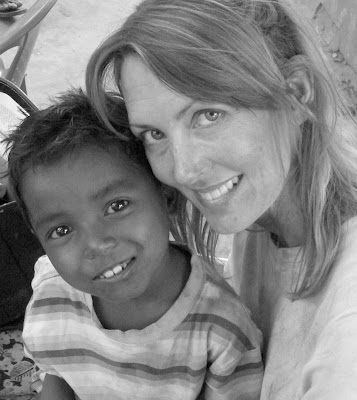
I never expected to be in India. And without a doubt, I never thought once I had been I would return, again and again.
It wasn’t the exotic beauty that drew me back. It wasn’t the warmth of the people, their gentle and inquisitive nature, their open hospitality. It wasn’t the storied, ancient history of the country or its rich and varied culture. It was not the colors or the spices or the sounds or the spirituality of the place. India is all of these things, to be sure, and I have grown to love them all. But they were not what seeped into my being and pulled me close, becoming a part of me that I missed with a strange emptiness when I left.
It was the children.
They are everywhere. They fill the railway stations, the cities, the shanty villages. Some scrounge through trash for newspapers, rags or anything they can sell at traffic intersections. Others, often as young as two or three years old, beg. Many are homeless, overflowing the orphanages and other institutional homes to live on the streets. I had no way of knowing just how much they would change my life.

Amir
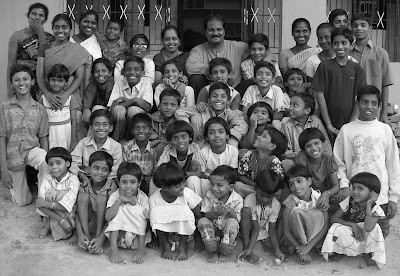
Little Hearts Group
“Our lives begin to end the day we become silent about things that matter.”
–Martin Luther King, Jr.
* * *
One Year Later – March 2005
The plane from Delhi started its final descent for landing and my heart began to race. After thirty-six hours of travel this was the last leg of the journey bringing me and ten other volunteers to Bhubaneswar, capital of the northeastern state of Orissa located four hundred kilometers south of Calcutta, where the Miracle Foundation orphanage director, Damodar Sahoo, would meet us. As the plane touched down my stomach tightened while I waited impatiently for the exit doors to open. Eleven dazed Americans emerged into the piercing sunlight and walked across the tarmac to the small terminal. Caroline was immediately spotted by Mr. Sahoo – the man known to all simply as “Papa.” In his white Punjabi suit that looked a bit like pajamas he was just as the pictures I’d seen of him, only bigger. A large man, not fat but substantial, Papa swept Caroline into his arms for a hug across the metal bars separating the passengers in baggage claim from those waiting for them. He lifted his large, thick 1980s style glasses from the bridge of his nose and dabbed at his eyes with a handkerchief.

Sibani
It was then that I saw he had an entourage. Behind him were his wife, two women staff members, and three girls from the home. They broke into huge smiles, waving excitedly and calling “Sister Caroline!” Caroline greeted and hugged them all while the rest of us gathered our luggage, our energy suddenly replenished. As we each showed our passport and exited the gate, the girls handed us bouquets of marigolds and red roses, then kissed their fingers and bent down to touch our feet in blessing. The oldest girl, Jhillismita – nicknamed Jilly – was about fourteen and wore a brilliant blue salwar kameez, the casual Indian outfit that many girls of adolescence and older wear, comprised of a long top over matching pants and a scarf. The two younger girls, Pinky and Meena, were around seven years old and dressed in simple cotton floral schoolgirl dresses, with headbands holding back their short glossy hair. They were bashful with us, dropping their heads and giggling together when we tried to take photos with them.
Our group made its way outside as everyone else in the small airport stared after us. Two jeep-like vehicles were brought around for all eighteen of us and our piles of luggage. Long moments of delay followed while Papa and the drivers held a frenzied discussion. I stood by with the other volunteers pretending not to notice the passersby pointing us out to each other. I wasn’t sure what the waiting and confusion were about, but after only a few hours and two airports was beginning to understand they accompanied most everything in India. At last our luggage was crammed into one car and tied to the roof of another and everyone piled in. We zoomed away from the airport, narrowly missing bicycles, pedestrians, cows and mopeds. Our driver, like all the others around him, merely laid on his horn continuously – presumably to warn those in his path that it would be their fault if they were struck, having been given adequate warning.
As we entered the city, the cacophony of sights and sounds that was Bhubaneswar was jarring after the peaceful countryside I had gazed down on from the airplane. From the air the beauty of the place was unmistakable. Lush trees and hillsides, stands of palms along lakes and rivers. The green was a richer shade than I’d ever seen before, the water a serene silver mirror reflecting sky, the pure undeveloped land seemingly endless. Now, in the midst of it, there seemed no still or quiet space. Instead there were throngs of people everywhere, living and working and sleeping; hundreds of street vendors lined every available inch of sidewalk. The dusty roads peppered with potholes were filled with a constant stream of buses, bicycles, rickshaws, cars and cows; and rising over it all was the constant, blaring beep-beep of the horns. It was the most alive place I had ever been.
Leaving Bhubaneswar we drove another twenty minutes before reaching the smaller city of Cuttack, near the orphanage. We stopped briefly at the hotel to check in and leave our bags before continuing on our way to Papa’s ashram. Another careening ride down the bumping roads and a drive across a curious toll bridge on which there was much exchange of words and then money, more waiting, until the gate was finally hand lifted by a guard. Night was falling as we lurched along and then, without warning, turned in through the gates.
In a second, the cars stopped where rows of children were lined around the drive in a semi-circle, waving and chanting “welcome” over and over. I climbed out and they were all around, touching my feet in blessing. Overwhelmed and unsure what to do, I blindly followed behind Papa and Caroline amidst the sea of small bodies. The children were shy at first, excited but reticent. One little girl of about seven summoned her courage and touched my arm, then took my hand.
“Hello,” she said softly, looking up briefly before her eyes slid away from their contact with mine. As soon as she did this, the surrounding children shed their reserve and moved in close, putting their hands out for me to shake. I did, over and over; there was a never-ending supply of hands raised in front of me.

Sahiful
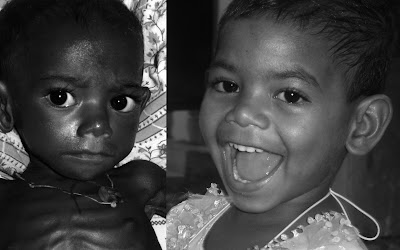
Sumitra
“Hello, hello,” I greeted dozens of children who passed as a blur before me, the throng of us slowly making our way into the ashram. Everything seemed to be happening so quickly, I didn’t have time to look around, to see the new wing The Miracle Foundation built or get any sense of where I was in the darkness. There were just the children, all around, and my feet moving forward until we came to a courtyard. As one the kids left our sides and began climbing a staircase in an orderly fashion. We followed with the dozen or so staff, removing our shoes at the top of the stairs and entering the prayer room.
The children were already lined up and sitting on rugs on the floor, boys on one side and girls on the other, ages progressively going up toward the back with older kids sitting behind younger. Ceiling fans whirred overhead to stir up the warm air. We were escorted to the front of the room where we, too, sat cross-legged – male volunteers on the boys’ side and female volunteers on the girls’. At the front of the room was an altar holding flowers, small trinkets of devotion, a picture of the guru Sai Baba and a statue of Vishnu, an ancient Hindu god. Tacked to the walls on all sides were pictures of other Hindu gods – Ganesh and Krishna – as well as Jesus, Mary, Mother Theresa and Mohammed. A staff member lit incense at the altar while another blew a horn softly. The children sat up straighter and ceased any fidgeting or whispering.
Papa walked to his brand-new podium and microphone, a contraption he was clearly proud of, and began to speak. Alternating between English and Oriya, the local dialect, he welcomed Caroline as his “daughter” and the volunteers as friends, introducing us one at a time. When Papa called my name a girl I later learned was Sibani presented me with another bouquet and bent down to touch my feet.
Then the prayers began. It started with a simple chant: “Om….om..,” the small voices resonating deeply. Finally things slowed down enough for me to begin to take it all in, to look at the kids clearly and in light, to start to feel my heart calm. The chanting gave way to a song, a hundred sweet voices dancing in the air and filling the room. Beside me on the rug sat one of the smallest girls, with glossy black curls and deep dimples. She was sitting lotus-style with her middle fingers and thumbs pressed together on the knees of her yellow and green flowered dress, eyes squinted tightly shut in concentration. Her strong, clear singing distinctly carried to my ears apart from the others. The voice of this three-year-old rising so pure and true was one of the most powerful sounds I had ever heard.
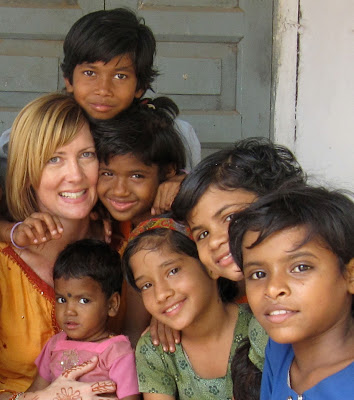
Soon the singing faded into silence and Papa prayed. He said there were many religions represented and respected in the ashram. “Here, there are Hindus, Christians, Buddhists and Muslims. We pray,” Papa said, “to God and Allah and Jesus and Mohammed. The meaning of life is to love all. The purpose of life is to serve all.”
It was a simple prayer, reminding me that life need not be complicated unless we made it so. A soothing peace palpable in the air filled me, and I breathed out deeply. The past forty hours of travel and little sleep fell away as if they were nothing. There seemed no other world outside this place. As Papa spoke my eyes traveled over the faces all around me. I wondered when each of them had stopped wanting to go home, or if they ever had. As much of a loving community as the ashram seemed, it was not the family that most of the children had once known, distant and ghostly memories for the most part.
Home is a fragile concept – far more delicate than those of us who have always had one can imagine. When a person no longer has a home, when his family is taken from him and he is deprived of everything that was familiar, then after a while wherever he is becomes home. Slowly, the pieces of memory fade, until this strange new place is not strange anymore; it becomes harder to recall the past life, a long ago family, until one day he realizes he is home.
The stories that were shared with me do not belong to me. They were given to me as a gift, often because I was the only person who had ever asked.
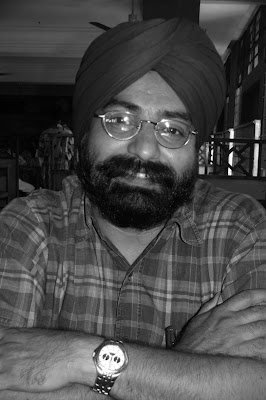
Manjeet
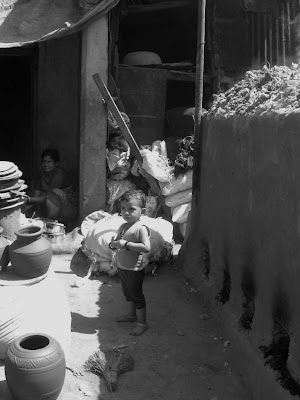
Dharavi
In The Weight of Silence, Shelley shares disheartening statistics about child labor, child trafficking, AIDS and its impact on families (and India), lost kids, and more. Yet, interspersed within is a great story of hope, a slice of hard work and courage and the amazing resilience of children to adapt and find joy in the smallest of things. I laughed and cried when I read The Weight of Silence...and re-read it right after I finished. Somehow, these kids and their smiles work their way into your heart, and lead you to believing that despite the terrible circumstances of their lives, their extraordinary selves can shine through and make a path to a good life. It doesn't always happen - there are too many kids, too many people willing to take advantage of them - for each story to end happily. Yet, there is enough hope in the kids and the people who believe in them that some WILL succeed - and will change the world. We care about these kids, deeply.

Santosh
Thank you, Shelley, for writing such a powerful book that has touched the lives of so many, many people.
For more information, and to order the book, please see:
http://weightofsilence.wordpress.com/
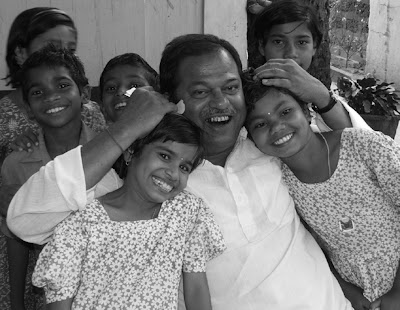
Papa
All photos courtesy and copyright Shelley Seale.
